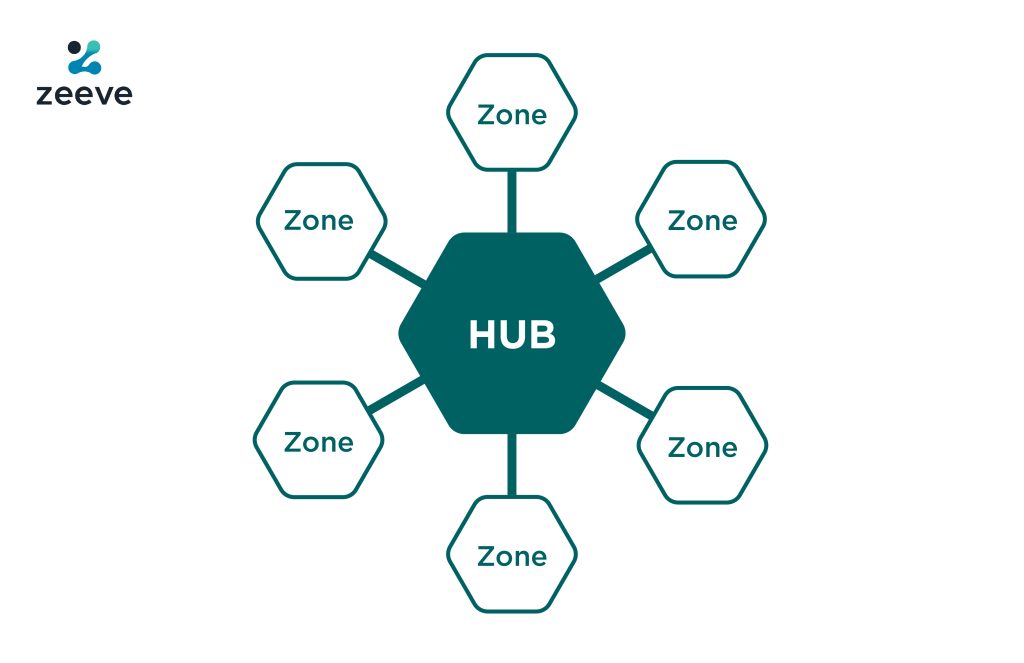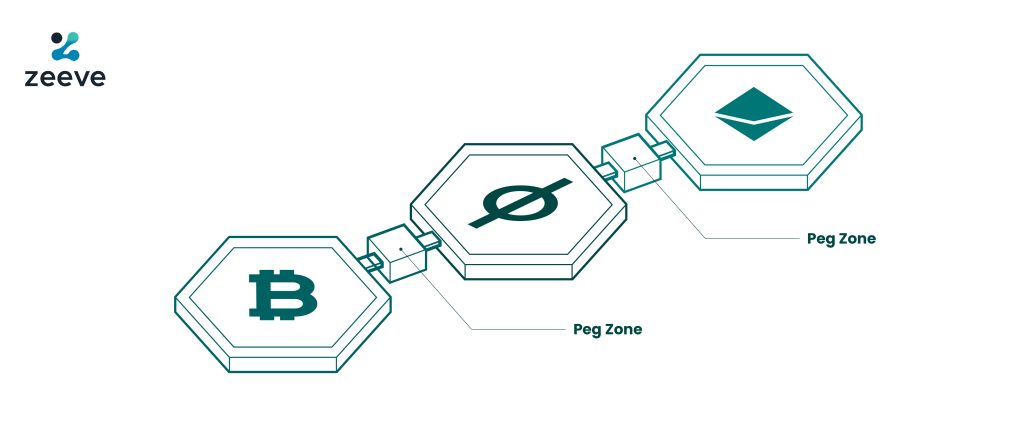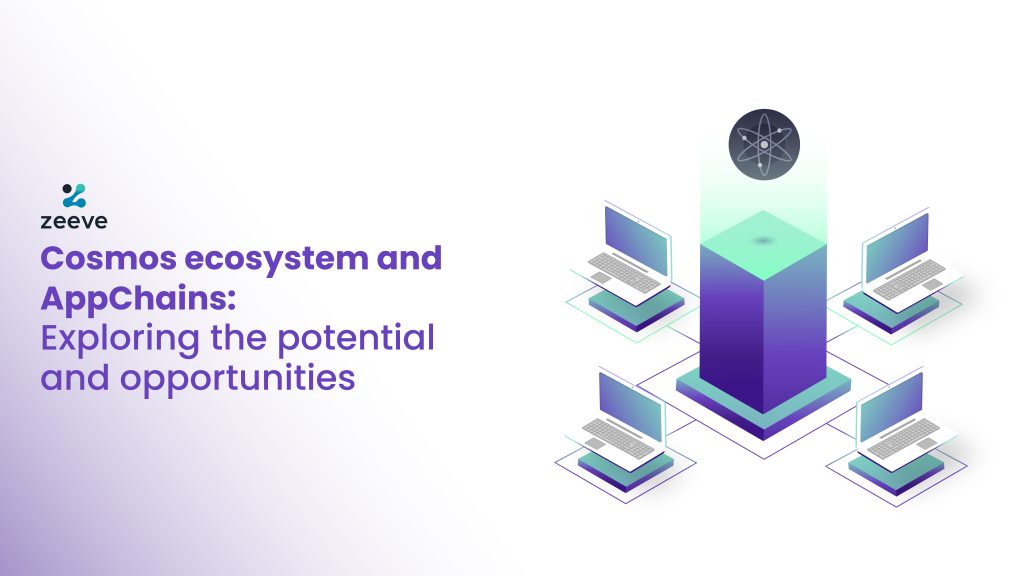AppChains are certainly becoming a prevalent way for enterprises to manage large dApps on an independent, easily scalable infrastructure. Cosmos is a popular protocol enabling an interoperable ecosystem where heterogeneous blockchains can communicate with each other without the intervention of third-party software. Enterprises looking to build interoperable application-specific blockchains can accomplish their project with the Cosmos ecosystem. Cosmos offers all the essential components, such as Cosmos SDK, IBC, and Tendermint core, required to build custom blockchains that are interoperable by default. In this regard, let’s deeply analyze Cosmos’s approach to enabling Cosmos Appchains for enterprises.
Digging into Cosmos thesis of application-specific blockchains
Cosmos network is designed to facilitate the seamless development and deployment of application-specific blockchains. Cosmos realized the potential challenges large dApp projects face while managed on a shared ecosystem. The protocol, in alliance with Tendermint, proposed a novel method to build a blockchain. Cosmos facilitates the creation of an independent, custom blockchain as ‘Zones’ to run a single dApp on it. This separate blockchain or Zone is what we call AppChains or application-specific blockchains.
Multiple Zones on Cosmos are connected to Hub for interoperability purposes. Be clear that building application-specific blockchains (Zones) on Cosmos is all about building a blockchain. For this, Cosmos offers an advanced, open-source framework — Cosmos SDK that enables enterprises to build unique application-specific blockchains such as public Proof-of-Stake (PoS) blockchains (similar to Cosmos Hub) as well as permissioned Proof-of-Authority (PoA) blockchains. Even when you build a sovereign chain on Cosmos, your blockchain is still secured through CometBFT— a distributed, Byzantine fault-tolerant, state-machine replication engine. This mechanism will significantly increase the security and stability around your dApp.
Also Read: How to launch your application-specific blockchain?
Now that enterprises can manage their dApp efficiently on an application-specific blockchain, they may come up with a question- “why should I create an application-specific blockchain with Cosmos when there’s already an option to build on the top of EVM blockchains?”
Of course, enterprises can opt to build their blockchain on Layer-1 and Layer-2 protocols, but the decision should be made based on the project type. For example, if your dApp size is small to average, then it can easily be managed on any EVM blockchain. However, if your dApp size is big, then you need an application specific blockchain. Now, to answer why one should use Cosmos— Cosmos SDK brings a new and effortless approach to creating an application-specific blockchain which is as easy as programming a few modules. With such great ease, Cosmos encourages worldwide enterprises and startups to develop application-specific blockchains for their large-sized dApps, improving interoperability, performance, and security elements. Knowing that Cosmos is an ideal ecosystem for application-specific blockchain development, let’s look at four important aspects of Cosmos AppChains for enterprises:
Enable AppChain security with Cosmos
Building your dApp on top of a virtual-machine engine means relying on the shared security from the underlying Layer-1 ecosystem. The Cosmos-SDK adopts a different security approach based on object capabilities, providing maximum protection against security concerns. However, It’s important to note that no framework can ensure a 100% shield against developer mistakes leading to breaches. You can better use the services of an AppChain infrastructure provider to maintain unparalleled security all across your AppChain environment and to ensure there are no security breaches.
Enhance AppChain Performance with Cosmos
As we know, a blockchain ecosystem exists in three layers: networking, consensus, and application. While the Tendermint consensus engine on the Cosmos Network handles the networking and consensus layers efficiently, capable of managing thousands of transactions per second, the real bottleneck lies within the application layer. By developing Cosmos AppChain for your decentralized application, you only need to validate the transactions and state transition functions required for your application. This approach significantly enhances the application’s performance.
Leverage unbounded AppChain Customizability with Cosmos
AppChains built as Cosmos Zones offer greater flexibility, as developers can choose their preferred programming language. In the case of Cosmos, this applies when building the blockchain as an ABCI application on top of Tendermint. Nevertheless, building an application from scratch may be challenging, which is where the Cosmos-SDK comes in handy. Currently, it is available in Golang, but Cosmos looks forward to including SDKs in other prominent languages as well. Another existing framework on Cosmos is LotionJS, which permits developers to construct their Tendermint blockchain applications using Javascript.
Maintain sovereignty on your AppChains with Cosmos
Cosmos AppChains for enterprises bring them the choice to deploy it as a public (Proof-Of-Stake) or private (Proof-Of-Authority) chain. For both instances, validators exclusively validate transactions relevant to the specific application. This means that governance is confined to your application and does not interfere with other applications in the ecosystem. Consequently, if an issue occurs within your application, governance can address it without impacting other applications.
Make your Application-specific blockchains interoperable with Cosmos
Not every application-specific blockchains necessarily need to be interoperable, but if your enterprise works with different types of blockchains or regularly interacts with them for data and value-sharing purposes, then interoperability becomes essential at this point. Cosmos AppChains for enterprises provide this interoperability element to siloed ecosystems, allowing various heterogeneous blockchains to communicate with each other and scale endlessly. The vision of Cosmos is to make blockchain development and innovation easy for web3 enterprises by eliminating the barriers across blockchains for better sovereignty, the ability to process transactions faster, and optimize for a range of optimal use cases. To achieve such capabilities, Cosmos implements an Inter-blockchain communication (IBC) protocol based on Tendermint consensus to allow independent, parallel blockchains to interact and seamlessly transfer different values, arbitrary data, and smart contract elements.
Cosmos continues to serve enterprises with its standard architecture of two unique blockchain classes – Hubs and Zones. Zones in this concept are the heterogeneous blockchains and Hubs to connect these zones. Once a Zone maintains an IBC connection with the Hubs, this Zone can interoperate with all the zones associated with that specific Hub, forming a cross-chain system. Cosmos Hub is the first to launch on the Cosmos Network, a Proof-of-Stake blockchain with native token ATOM. The below image makes it easy to understand the ‘Hub and Zones’ mechanism:

So far, we have discussed how Tendermint-powered (Zones) blockchains can interact. However, the Cosmos ecosystem is not limited to these chains. In fact, any blockchain can connect to Cosmos and contribute to the cross-chain infrastructure. For this, Cosmos distinguishes the parameters as fast-finality chains and probabilistic-finality chains. White it allows fast-finality chains like Ethereum to connect with Cosmos using IBC, blockchains that cannot offer fast finality can use Peg-Zone to leverage bridging functionality and continue to engage in cross-chain activities.

Start your Cosmos Journey with Zeeve
Hopefully by now this article has clearly explained the concept of Cosmos AppChains for enterprises. Given that application-specific blockchains are relatively new, Cosmos encourages enterprises and web3 developers to participate in the ecosystem, build their dApps, and application-specific blockchains to run dApps using Cosmos SDK, thereby making Cosmos a fully-fledged and future-oriented ecosystem. However, building a blockchain and managing it are two completely different aspects. You have to manage multiple nodes, wallets, validators, explorers along with maintaining security compliance on various levels. Zeeve tackles all these challenges for enterprises, simplifying their development journey on Cosmos. Zeeve further allows you to quickly deploy your application-specific blockchain via a plug-n-play solution and manage the network infrastructure on vital parameters so that you can launch your dApp with faster time-to-market. Talk to our consultants to know more about our AppChain-based offerings.





